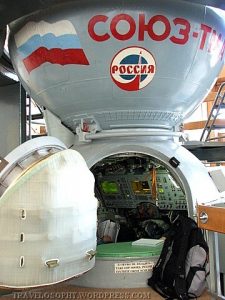Russian cosmonauts Pavel Vinogradov and Alexander Misurkin and NASA astronaut Christopher Cassidy, a former Navy SEAL, passed their standard Soyuz pre-flight exams with maximum scores on Monday, March 4th in Star City, Russia. To test astronauts’ capacity to face the potential risks before them, the Yuri Gagarin Center tested the crew in a four day examination inside life-sized spacecraft simulators, in advance of their launch from Baikonour, Kazakhstan on March 29th.
The exam consisted of a series of emergencies that the crew had to deal with during the flight simulations. Emergencies are identified with a code so the examinees will not know in advance what they are going to face during the test. “It’s too late to be afraid of anything at this stage,” commented Misurkin before entering the station’s imitation module.
Media were not allowed to follow the entire process, but cosmonaut training supervisor Valery Korzun revealed the finale in advance: “The main emergency will be…fire!” The Gagarin Center’s press service reported that the crew passed it successfully, as expected.
The crew will have even less time than usual to respond to emergencies on this trip. Soyuz launcher performances have been improved over the years, thanks to improvements in computing equipment and the accumulation of ballistic data from past launches. This trip will be the first manned trajectory to ISS taking six hours instead of the usual two days. Two unmanned cargo vessels have already tried out the accelerated rendezvous trajectory. “If everything goes well, the short trip may become standard procedure for flights to ISS starting late 2013,” said Sergei Krikalev, the head of the Yuri Gagarin Cosmonaut Training Center in Star City. Doubtless, the astronauts are happy to spend less time in the cramped capsule, although orbital mechanics of the shorter trip impose restrictive launch windows reducing launch flexibility.
Another goal remains to be achieved by cosmonaut Vinogradov: to become the oldest Russian in space. Vinogradov will spend his 60th birthday in orbit, on August 31, overtaking Valery Ryumin who flew at the age of 58. The top record, however, will still be held by US astronaut John Glenn, who flew to space 36 years after his first flight at the age of 77 years old, in 1998.
Below, the crew prepare for their exam:


















































































































![A trajectory analysis that used a computational fluid dynamics approach to determine the likely position and velocity histories of the foam (Credits: NASA Ref [1] p61).](https://www.spacesafetymagazine.com/wp-content/uploads/2014/05/fluid-dynamics-trajectory-analysis-50x50.jpg)



Leave a Reply